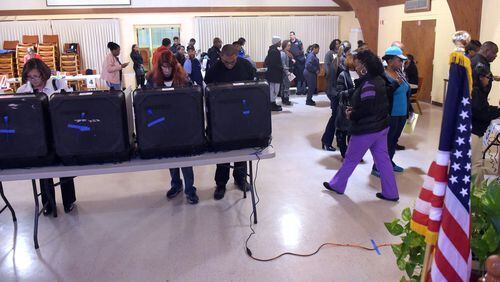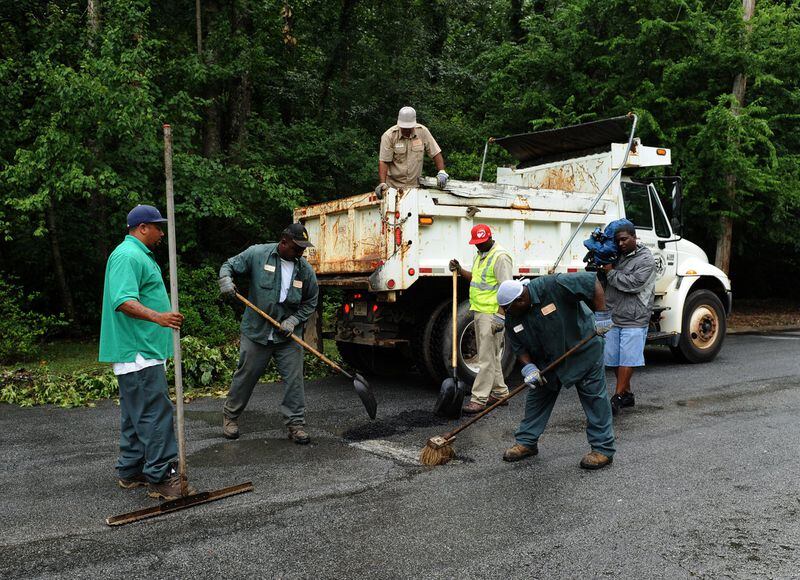It will become a little more expensive to shop in DeKalb County if voters approve a 1 percent sales tax, part of the county's most significant tax overhaul in 20 years.
The sales tax increase from 7 percent to 8 percent would raise hundreds of millions of dollars for road repaving, fire house construction, police cars, sidewalks and other infrastructure.
While sales taxes would go up, property taxes would go down. The sales tax is paired on the ballot with a measure that would use some of existing sales tax revenue to lower homeowners’ property tax bills.
Besides creating income for local governments, the changes are designed to eliminate tax inequalities between unincorporated DeKalb and its cities.
All DeKalb voters are eligible to decide on the tax referendums. Many voters who live in cities can also cast ballots for their mayors and city council members.
Sales tax
DeKalb County has never had a special purpose local option sales tax (SPLOST) for government infrastructure. This SPLOST would raise about $100 million a year over the next six years, split between county and city governments.
It would fund long-neglected transportation, public safety and facility maintenance projects, including 320 miles of roads in poor condition in unincorporated DeKalb.
Sales tax collections would be distributed proportionately based on population — 61 percent to unincorporated DeKalb and 39 percent to cities.
The amount of sales tax revenue dedicated for unincorporated infrastructure would increase from $1.5 million to $65 million annually. For cities, infrastructure revenue would rise from about $20 million to $41 million.
Property tax
When DeKalb voters last agreed to raise sales taxes in 1997, they increased from 5 percent to 7 percent. Those taxes funded an education SPLOST as well as a peculiar sales tax called the homestead option sales tax (HOST). Most tax collections from the HOST are returned to homeowners in the form of discounts on their property tax bills; 20 percent of HOST funds government infrastructure.
Over the years, tax distributions from HOST became increasingly inequitable, in part because of the creation of new cities. The incorporations of Dunwoody in 2008 and Brookhaven in 2012 cut into the county's share of infrastructure revenue under the HOST distribution formula.
Cities benefited by receiving more money for public infrastructure, while unincorporated homeowners benefited from larger property tax refunds. The HOST tax break favored unincorporated residents because it provides a discount on county taxes but not city government taxes.
If voters agree on Nov. 7, the HOST would be changed to an EHOST — an equalized homestead option sales tax.
All EHOST proceeds would go toward property tax relief, providing homeowners countywide with the same discount rate on their county property taxes, regardless of whether they live in unincorporated DeKalb or cities.
The SPLOST and EHOST must both pass to be enacted. If voters reject either, they both fail.
Costs and benefits
If approved, an owner of a $200,000 home would receive a total annual property tax discount of $750 to $800, regardless of where they live in DeKalb. But unincorporated residents would see a smaller increase in their property tax refund after years of higher tax breaks than city residents.
The property tax relief for a $200,000 home in a city would increase by an average of $437, according to estimates from the DeKalb Budget Office. The same home in an unincorporated area would get $147 in additional property tax discounts.
Meanwhile the sales tax increase would cost roughly $75 to $150 per resident, depending on how much they spend, according to a 2012 Georgia State University study. Unprepared food and medicine are exempt from the proposed sales tax.
Frozen exemption
The third referendum on DeKalb’s ballot would make permanent an existing property tax exemption for homeowners.
The frozen exemption offsets DeKalb property tax increases caused by rising property assessments. Voter approval of this measure would make the frozen exemption permanent for as long as the EHOST — if it passes — remains in place.








